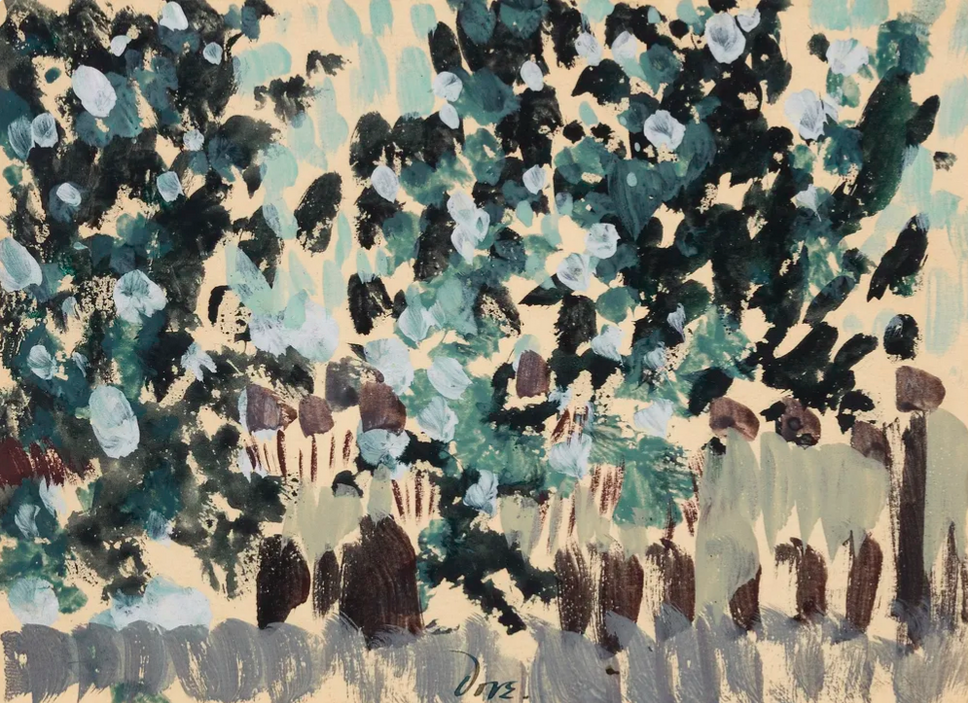Fiction
FALL 2022Mudpuppy Run
by JOHN MACNEILL MILLER
Young men will never say the phrase “young men.” They call each other any number of names to avoid it—anything to distract themselves from their own incompleteness, from the fact they are stuck together in the same painful transformation.
“Guys,” Dominic says as the three of them straddle their bikes on the packed dirt path by Mudpuppy Run. The word is whispery, barely louder than the burbling stream. It calls them together in secular confession. They lean in and he tells everything. He names the parts of the girl from youth group, spreading her like a map before them. Dom mimics her dovelike sounds as his fingers wandered across her. Sterling snickers. Alvin holds his breath, bowing low as the words tumble over him.
“Dude,” Dominic shouts one afternoon when Alvin shoves him from the culvert. That day they are back to the sort of exploring they used to do, hands and sticks probing the shaded crannies of the creek. Alvin finds Dom atop the concrete tunnel, craning over the edge to ogle the pool and the glassy-eyed creatures inside it. It is affection that makes Alvin grip the neck of Dom’s shirt and push forward. “Saved your life” he will say when he pulls his friend back. Except he doesn’t. He never forgets the way Dominic says “dude,” how it starts part amused, part annoyed then thins out to an insubstantial squeak as he plunges over the edge.
“Bro” means something other than brother when Sterling and Dom call him that on the final day of August at Mudpuppy Run. But everything drips with double meaning now. The rasp of Dom scratching his orange cast against the handlebars means some shattered attachments are healing, some are hopelessly broken. Even the air is no longer empty. Its once cool currents are hot with copulation. Damselflies buzz by, bodies locked in rutting. Someone has started wearing deodorant—or is it cologne? Sterling and Dom say something about the youth group girl, laughing before Alvin understands. The pollen blowing from bloom to bloom nettles Alvin’s nose. He turns away, wiping his eyes to hide what looks like crying. Everywhere is evidence of some connection Alvin is missing.
That’s when it hits him.
At first Alvin thinks Sterling and Dom have thrown it just to see his response. It is something gross probably, a ball of mud or sticky litter. He wheels around to face them but finds nothing nasty in their eyes. There is only surprise and a kind of confusion. He reaches for his hair and Dom jumps: “Don’t touch it.”
“What is it?”
It is something green, and it came from the trees. The wind has picked up. The place is filled with shushed rustling, louder than the flow of water over stones. At first the thing seems blown down, a clump of bright maple leaves maybe. But now it is obviously active, scrambling and tangling its way into Alvin’s hair.
“Guys? Get it off me!” In a calmer moment Alvin would be embarrassed by his voice cracking. But now all he feels is terror at another obscure thing in the world—something new he wants distance from. It is roving over him, feeling its way through the curling hair he left uncut in halfhearted rebellion.
Fear does not stop Alvin from noticing his friends turning on him. Their surprise starts to fade. In its place is relief and a sense of their own safety. Alvin’s situation suddenly looks funny.
“Get it—” he begins again. He sees they are going to laugh. But before they can do it another thing flutters in and hits Alvin like a hard dry kiss on the cheek. He can’t help it. He screams.
The other boys feel bad. This oddness has gone too far. They can see now that whatever is landing on Alvin is nothing awful. Some kind of giant butterfly, the electric green of spring leaves. They move in with every intention of helping him. They can laugh later. (In these very moments they are storing up Alvin’s starts and screams the way they once collected pebbles in their pockets, instinctively sensing they might have value in far-off bribes.) They step closer, hesitate a second, look at each other. Neither wants to be the first to touch the fat furry bodies, the pink and protruding feathered appendages.
The wind picks up again. It brings a blizzard of green and yellow wings. They tumble over each other, flutter and knot like colored tissue paper blotting up the spot where Alvin once stood. The boys draw back in panic. (Maybe they cry out themselves. If so they never admit it.) They start slapping imagined invaders off their own clothes. There is no time to look up, to see Alvin, to think of how to help. That is how they explain it afterward.
From what Alvin can tell his friends are already gone. The smack of bodies and tickle of legs over exposed skin horrify him only for a few moments. Before long he stops fighting each added abdomen and articulated limb as they clamber onto him. All he feels now is how they anchor him in this place with their accumulated weight. They blur together into one unexpected but not unwelcome entity, brushing him with the intimacy of eyelashes, holding him with the gentle certainty of fingers gathered into a thousand impossibly soft hands.
John MacNeill Miller
John MacNeill Miller teaches about literature, animals, and the environment at Allegheny College in Meadville, Pennsylvania. His writing has appeared or is forthcoming at Peatsmoke, Flyway, About Place Journal, and other venues. He tweets @Snarls_Dickens.

